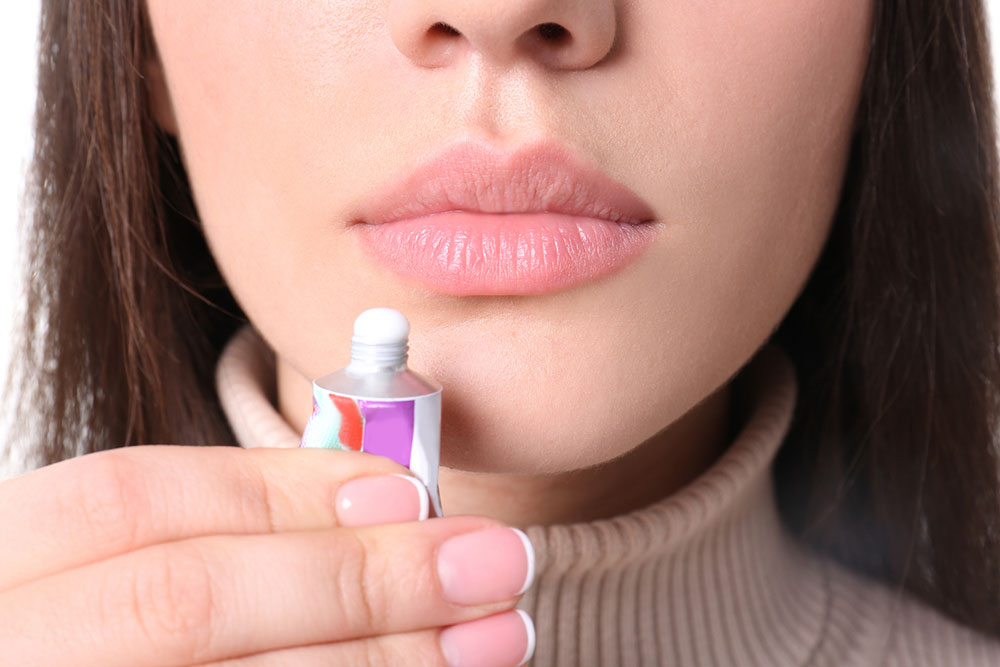Top 8 cold sore remedies

Cold sores, also known as fever blisters, are a type of viral infection. While they usually heal in a couple of weeks, they are quite bothersome. The pain, itching, and burning sensations add to the overall discomfort. Fortunately, one can alleviate cold-sore symptoms with various home remedies. Most of these involve a few kitchen ingredients that are easily available. Here are a few remedies that can help one get rid of cold sores:
1. Apple cider vinegar
Apple cider vinegar is a pantry staple in most kitchens. While it does wonders for bringing out flavors in salad dressings, this ingredient can also fight off viruses and come to one’s aid when one is afflicted with a viral infection. So, it can also be used as a simple yet effective home remedy for reducing cold sores. That said, one must err on the side of caution when using this as a home remedy. Apple cider vinegar is quite potent, and applying it directly to the sores may hurt or cause more irritation. One must dilute it with water in a 1:10 ratio to avoid that. This diluted solution can then be applied to the cold sore with a cotton ball once or twice daily. This remedy can be continued until the cold sore goes away.
2. Aloe vera gel
Aloe vera gel is another natural ingredient proven to be effective in reducing cold sores. It has been found to have properties that can fight off and reduce the growth of the HSV-1 virus, which is responsible for causing cold sores. All one needs to do is apply some gel to the cold sore. That said, some people are quite sensitive or allergic to aloe, so doing a small patch test is vital to check how one reacts.
3. Propolis
Propolis is a resinous substance produced by honey bees. They generally use the sap of evergreen or cone-bearing trees to make propolis. However, its composition may vary from region to region based on the types of trees and flowers it has. Propolis has antiviral properties and is effective in reducing cold sores. It is usually available in cream form, which can be applied to cold sores.
4. Honey
Besides propolis, honey is another bee product that effectively reduces cold sores. One type of honey, kanuka honey, is more effective in this. But if one does not manage to get their hands on kanuka honey, they can also use manuka or regular honey and dilute it with apple cider vinegar. Mix diluted apple cider vinegar with some honey to make a paste before applying it to the cold sore. Apply this twice daily, and keep it on for 5–10 minutes. After 10 minutes, wipe it off gently with a soft cloth.
5. Lemon balm extracts
Lemon balm is an herb plant that belongs to the mint family. Studies have shown that applying the extract of this plant has been effective in reducing cold sores. It has been found that lemon balm extracts reduce the growth of the HSV virus, thereby reducing the sores. One can also easily find lemon balm gels made with this extract to apply to their cold sores.
6. Essential oils
Several essential oils with natural plant extracts have also been effective against cold sores. Tea tree oil, for instance, has a healing effect on cold sores. Peppermint oil, too, is quite effective in reducing blisters. Besides these, several other essential oils have shown antiviral and inhibitory properties against the HSV virus. These include rosemary essential oil, clove essential oil, cinnamon essential oil, basil essential oil, and sandalwood essential oil.
7. Vitamin C-rich foods
Vitamin C does not necessarily have any antiviral properties. However, it has properties that can help the immune system fight infections. So, one can consume vitamin C-rich foods to boost the immune system. These foods include berries, tomatoes, citrus fruits, and peppers.
8. Ice
Ice can help alleviate the irritation and pain usually accompanying cold or fever sores. When applying ice, one must be careful not to apply it directly to their skin. This can actually irritate the skin even more. Instead, one can wrap ice in a towel and gently pat the sores for 10–15 minutes.
Other tips to manage and prevent cold sores
Besides trying these remedies, one can also do other things to manage cold sores and prevent them from returning. These include the following:
1. Avoid touching them
When a cold sore appears, it can be hard to resist touching or picking it. However, doing so will only worsen the situation. Not only can it increase the irritation and pain, but it will also spread the sore to other parts of the body. One must resist the urge to touch or pick the sore to avoid this.
2. Use sunscreen
Long exposure to sunlight or getting sunburnt can also trigger cold sores. So, it is best to use sunscreen when stepping out.
3. Avoid triggers
If one is prone to cold sore breakouts, one must identify the triggers and try to avoid them.









